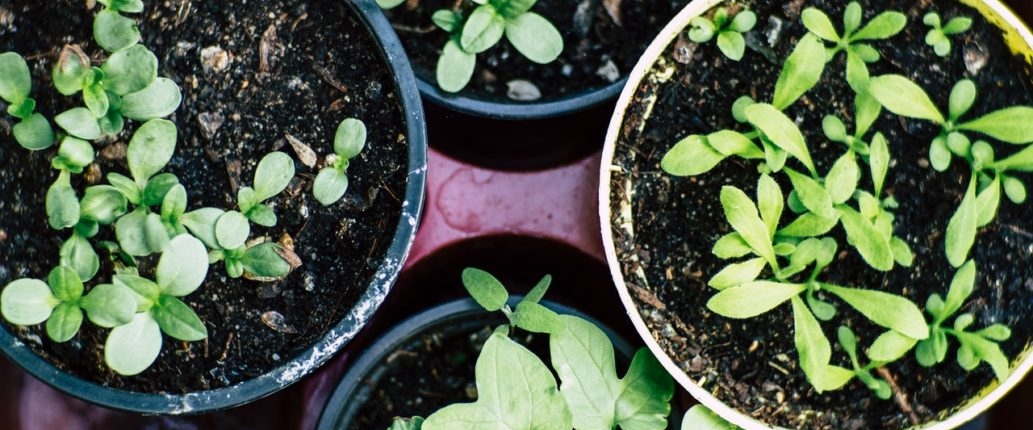Gardening for Total Health
Creating a garden is more than just planting beauty. Consider all the physical activity you get through lifting bags of soil, digging into the dirt, pushing the wheelbarrow around the yard, and walking from garden shed to planter box. The activity is just starting when you plant your garden. This will be a source of physical activity and movement for the rest of the season, providing you a space to pull weeds, tend to plants, and increase your step count, all while absorbing vitamin D from the sunshine. This article on WebMD estimates that gardening can help you burn between 200-600 calories per hour, revving up your metabolism for hours. Consider adding these culinary herbs to your garden plans this season for even greater health benefits.
Rosemary
Rosemary is a hearty plant that will grow without much attention. The health benefits of rosemary include improved cognition and memory. One study even showed improved test scores just from incorporating the scent of rosemary. It is helpful for liver function and gently supporting the detoxification processes your body already has in place. Because of this, I like to use rosemary for supporting hormonal imbalances and elevated cholesterol, since the liver is our VIP organ in these functions. Once rosemary has been established in the area you have planted it, you can harvest the leaves for use in recipes, or as an aromatic herb for adding a touch of freshness to any space. Rosemary pairs well with chicken, fish, roasted vegetables, and potatoes. Try this unexpected recipe for rosemary lemonade to experience this plant in a different way this season:
Honey Rosemary Lemonade
2 small sprigs of fresh rosemary, plus more for serving
Sea salt
1 cup fresh lemon juice, or more to taste
1/2 cup of honey
lemon slices for serving
Directions
In a medium saucepan, bring 6 cups of filtered water to a boil. Remove from heat and add the rosemary and a pinch of sea salt. Cover and steep for 30 minutes. Strain into a pitcher and cool to room temperature. Stir the lemon juice, honey and 2 cups of cold water into the pitcher. Adjust lemon juice, honey, or water, to taste. Serve over ice with a sprig of rosemary and lemon slices.
Recipe adapted from: Marcela Valladolid
Thyme
Thyme is a powerhouse when it comes to antimicrobial herbs. It also happens to taste lovely with grilled or baked veggies. It is easy to grow throughout the season. Wash thyme sprigs thoroughly and allow them to dry for several days to build up your stores to use during cooler months. When incorporated into a healthy diet, thyme may help maintain a healthy microbiome as well. Read the research on the benefits of thyme as part of a Mediterranean diet here.
Thyme Roasted Beets
2 medium golden or red beets, washed and trimmed
1 tablespoon olive oil
1 teaspoon fresh thyme
1/4 teaspoon salt
1/4 teaspoon ground black pepper
Directions
Heat the oven to 400 F. Wrap beets in parchment paper packet and bake for 40 minutes or until tender. Set aside to cool slightly. Peel the beets and cut beets into medium-sized chunks. In a medium bowl, combine the cooked beets, oil, thyme, salt and pepper. Place on a baking sheet and roast in the oven for an additional 5 to 10 minutes until hot.
Lavender
Lavender is known for its ability to calm the nervous system and lift your mood. In this study researchers found lavender used in aromatherapy increased melatonin – the hormone your body needs for sleep. Lavender also contains healthy flavonoids, which are anti-inflammatory when ingested. Lavender pairs well with citrus and strong flavors and is popular with herbs de Provence. You can use it on poultry, lamb or fatty fish, such as salmon. The English version of lavender is best for cooking and dried will be more flavorful than fresh. You can learn more about how to dry lavender here. Try this marinade recipe using dried lavender on grilled chicken or fish.
Lavender Summer Marinade
2 tablespoons dried lavender
4 tablespoons extra virgin olive oil
4 tablespoons honey
2 sprigs thyme
zest from 1 large lemon
juice from that lemon (about 1/4 cup)
1 1/2 teaspoon salt
Directions
Crush the lavender with a mortar and pestle. If you don’t have one you can put the dried lavender between parchment and crush it with a rolling pin. Combine crushed lavender with the other ingredients and whisk to combine. Pour over chicken or fish and allow to marinate for 30 minutes up to 4 hours then cook as you like. (Oven-baked, pan-fried or BBQ)




